The South Carolina Child Well-Being Coalition, which is led by Children’s Trust with funding from the S.C. Department of Health and Environmental Control, had its inaugural meeting May 14, when 175 child-serving professionals took the first step toward improving outcomes for children experiencing poverty. Neil White, who tells the stories of Children’s Trust, covered the event.
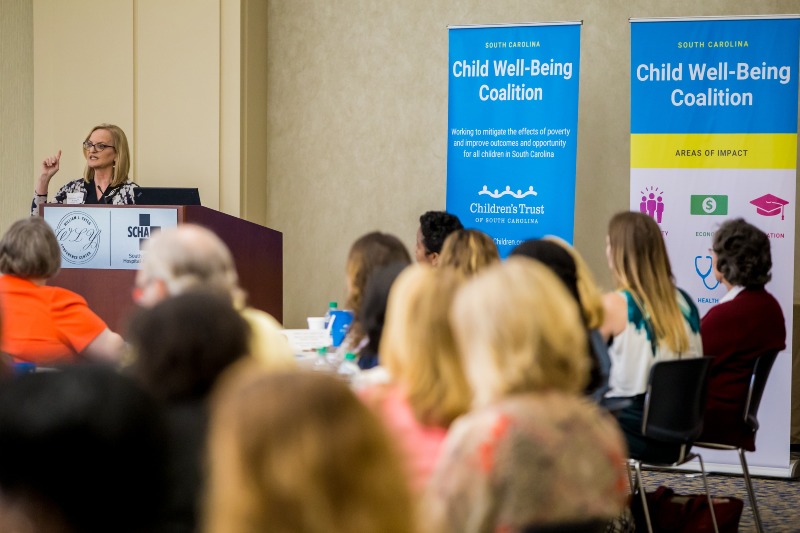
Dr. Christine Turley addresses the kickoff meeting of the S.C. Child Well-Being Coalition.
For South Carolina to mitigate the effects of poverty and improve outcomes and opportunity for all children in the state, Dr. Christine Turley strongly believes two qualities are necessary: Purpose and passion.
Turley, director of the USC School of Medicine’s Research Center for Transforming Health, stood before the first meeting of the South Carolina Child-Well Being Coalition with the hope that the 175 child-serving professionals who gathered from agencies and organizations across the state can bring commitment and energy to the collective work of building a stronger foundation for children.
“If we can figure out how to help kids be healthier in their day-to-day lives, then we can help them be in school more. And if we can help strengthen our schools, then we can improve their outcomes,” said Turley, who is serving as the coalition’s first chairperson. “And if they can be successful moving out of school into their adult life, we know that those achievement opportunities become much larger and lead to a path of well-being and stability.”
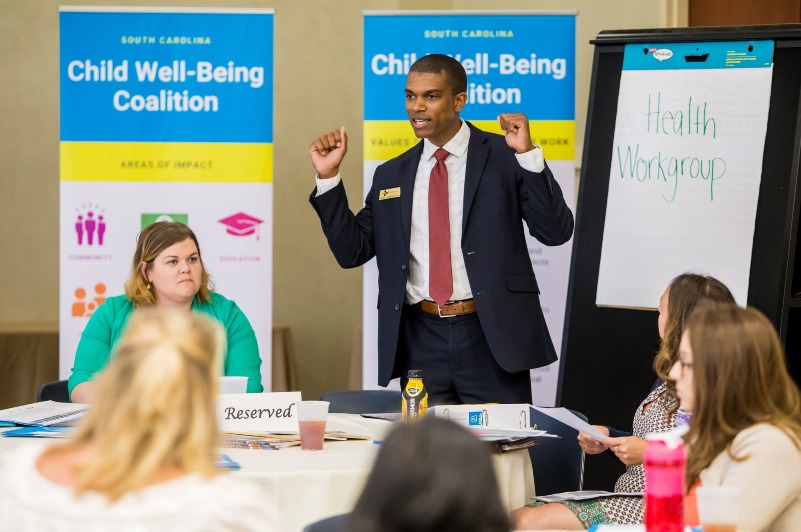
The health workgroup, with co-chair Monty Robertson speaking here, brought together attendees with expertise in that area.
The Child Well-Being Coalition, led by Children’s Trust of South Carolina and funded by the S.C. Department of Health and Environmental Control, held its introductory meeting at the S.C. Hospital Association’s Williams Yates Conference Center.
The coalition is a group of local and state agencies, child-serving organizations, and community leaders committed to improving the lives of South Carolina’s children with a focus on supporting and implementing evidence-based and promising programs and policies. The attendees represented a broad cross-section of professionals who work in community and social service occupations that want to find ways to help children grow up free from the devastating effects of systemic poverty.
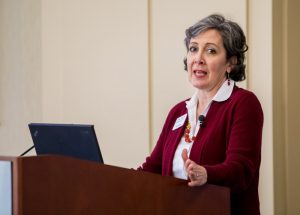
Sue Williams
“We know that a single voice is not loud enough and that resources are not as plentiful as they need to be. This means we must work together, unified and in concert, if we want to make a difference for our children,” Children’s Trust CEO Sue Williams said. “Although children only make up 25 percent of our population, they are 100 percent of our future. So we must get this right.”
While different organizations are working toward various specific goals – prevention of child abuse and neglect, lower teen pregnancy rates, more babies born healthy, better reading and math scores, higher immunization rates, working through emotional, behavioral or developmental conditions – all of them share a larger common objective of child well-being.
Kimberly Seals, the director of DHEC’s Maternal and Child Health Bureau, said it was important to bring Children’s Trust to the table to guide the effort because of its statewide connections as a convener of partnerships as well as its ability to evaluate research and data.
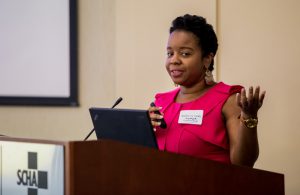
Kimberly Seals
“We want to be able to make sure that we are including partnerships in everything that we do, not working alone and not working against each other, and not duplicating efforts that are already happening,” Seals said. “We’re excited about working with Children’s Trust and others. It’s just that with any challenge, any hill that you’re about to start walking up, it’s good to be able to go together. We know that together is better, and we can definitely face challenges if we work collectively on a single goal.”
By using research and data to identify and measure what works, the coalition will strive to have a positive impact in the core areas of community, economy, education, family and health.
The coalition’s leadership committee also identified four values that will reinforce the work being done.
- Cultural competence: Ensuring work meets social, cultural, linguistic and geographic needs of children and families
- Prevention: Using a multidisciplinary approach to help leverage resources and services to reduce the negative impact of poverty
- Strengthening families: Building protective and promotive factors that mitigate the effects of poverty and enhance well-being
- Equity: Recognizing that inequalities exist and targeting strategies to achieve universal goals for all children
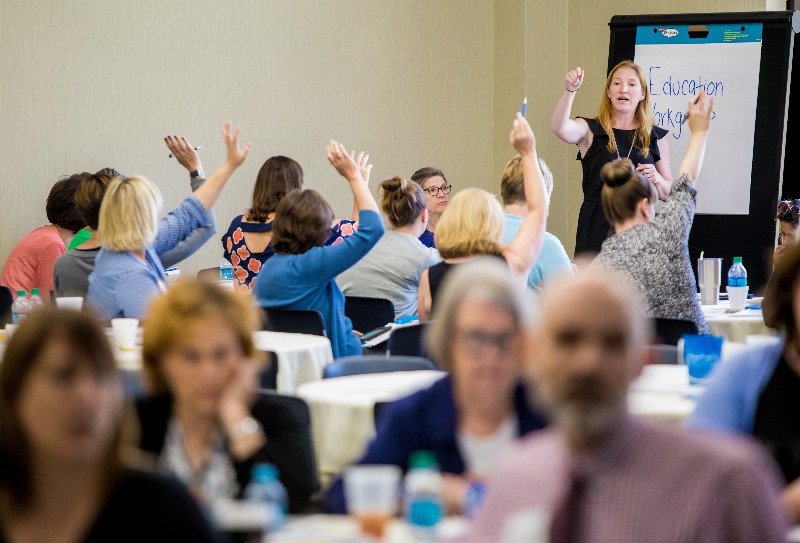
Jenny May, co-chair of the education workgroup, leads a discussion.
South Carolina currently ranks No. 39 nationally in the KIDS COUNT project of the Annie E. Casey Foundation, which releases its state rankings every summer on child well-being based on indicators of family and community stability, health, education, and economy.
Turley noted in her opening remarks that South Carolina has 256,000 children living in poverty, which would fill Williams-Brice Stadium three times over. That figure undermines a stronger future society as too many kids struggle to finish school, face health issues without insurance, and lack stable family homes. She concedes the issue is complex because tackling poverty at the statewide level can seem overwhelming.
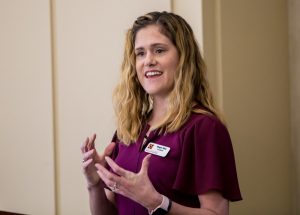
Megan Weis
Dr. Megan Weis, co-director of the S.C. Institute of Medicine and Public Health, points to the state being on the wrong end of too many lists that rank economic well-being, education, health and community. That is only going to change with a concerted effort to build momentum, align efforts, target goals and take action.
She was heartened by the conversations among attendees, the incisive questions being asked, and the expertise being brought to the workgroup sessions around the five impact areas of community, economy, education, family and health. Facilitators directed the give-and-take discussions as well as the goals being set for future coalition meetings.
Weis is convinced this group can accomplish more than talk, even though it’s going to be a long-term endeavor to reach true measures of achievement. She’s ready to take those first steps at making a difference in the lives of children.
“This is absolutely going to be an action-orientated group. Pulling together the leadership team and pulling together the right people, I think we’re finally at the right time for that,” Weis said. “Everyone here is already doing awesome work so it’s not convincing everyone that it needs to be done. I have a lot of hope and commitment. This is going to be an ongoing effort that, in the next year, we’ll be able to look back on some successes.”
Those interested in getting involved can become a coalition member, sign up for the mailing list at scchildren.org, and advocate for South Carolina’s children. For more information, contact Dr. Melissa Strompolis, director of research and evaluation at Children’s Trust, at mstrompolis@scchildren.org or 803-744-4048.
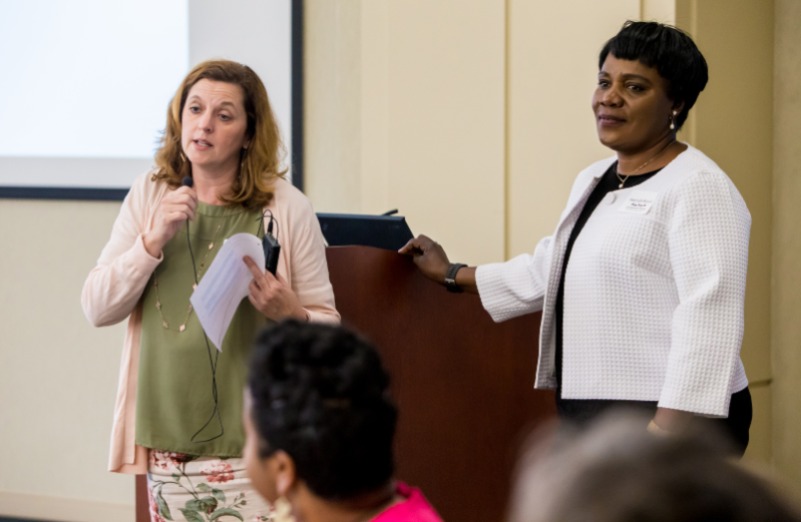
Maggie Cash and Hannah Bonsu report out as the community co-chairs.






